IRELAND COULD REWRITE ITS HISTORY BY JOINING GAMES
Posted By: August 02, 2014
Patrick Murphy. Irish News. Saturday, August 2, 2014.
YOU are no doubt looking forward with bated breath to tomorrow’s closing ceremony of the Commonwealth Games. (Anything less than bated breath would probably be deemed unpatriotic by the BBC, but apparently gleeful anticipation and unbridled excitement are acceptable substitutes.)
The more sceptical among you may ask: what is the point of the Commonwealth Games? (Sadly, despite years of political reeducation, pockets of scepticism survive in remote and desolate parts of our land.) Although shocked at such a sacrilegious question, we would politely reply that the ‘friendly’ games are a sporting occasion to mark the ethos, culture and ethics of the Commonwealth. (No disrespect is intended to any athlete competing in the games. Good luck to all of them and congratulations to those who won medals.) So what then, sceptics might ask, is the point in the Commonwealth – which consists of 53 former British colonies, covers quarter of the world’s area and includes a third of the global population?
As with all good explanations, there are at least two views. The Commonwealth Charter claims that the organisation is “a compelling force for good”. (It does not define ‘good’ but it is probably some sort of ethereal benevolence beamed from Britain to uplift lesser mortals on the planet.) ‘Good’ will be achieved by, among other things, promoting ‘world peace’. (Last year Britain issued 3,000 export licences for military and intelligence equipment worth £12bn to countries, which are on its own official list for human rights abuses. They included Russia, Israel, Egypt, Zimbabwe and China. Isn’t world peace just great?) The Commonwealth’s strength, says its charter, is based on “shared inheritance in language, culture and the rule of law.” The rule of law in 42 of the 53 Commonwealth countries states that it is a crime to be gay. An alternative view suggests that the Commonwealth is a public relations exercise to retrospectively justify the British Empire. It operates through an old boys’ club to deny the immorality and brutality of Britain’s historical holocaust. This view argues that English as a shared Commonwealth language reflects the suppression and destruction of indigenous languages and cultures throughout the former Empire. That leaves English as a permanent cultural insult. (Some former colonies perpetuate the insult. Enda Kenny recently appointed to the Department of the Gaeltacht two ministers whose Irish ‘wasn’t great’.) As the head of the Commonwealth, the Queen sent her royal baton (no, I did not know there was a royal baton either) on a 10-month tour of Commonwealth countries, prior to the Games. It contained a royal message saying that sporting accomplishments would “encourage us all to strengthen the bonds that unite us.” This was no doubt exciting news for many in some of the world’s poorest countries, including Kenya, Zambia, Uganda, Rwanda, Tanzania and Malawi. (Let them eat cake and if there is no cake, let them see someone running past with a British royal baton.) Britain is still completely unapologetic for the millions of deaths which the Empire caused. Tony Blair has said that there should be “neither apology nor hand-wringing” for the Empire. David Cameron has pointed out that Britannia did not rule the waves with armbands on. In yet another cover-up, Britain has destroyed thousands of papers detailing some of its most imperial shameful acts. These include the ‘elimination’ of the colonial authority’s enemies in 1950s Malaya and the torture and murder of Mau Mau insurgents in Kenya (including Barack Obama’s paternal grandfather).
While commentators praise Australia’s medal achievements you will notice few Aboriginal faces among its athletes. On the Australian island of Tasmania, for example, the British deliberately killed off all full-blooded indigenous people in the 19th century. The only survivors were descendants of Tasmanian women who were stolen by white traders and brought to remote islands as slaves. (While in exile in Tasmania, John Mitchel commented on the landscape and vegetation but he does not appear to have noted the absence of indigenous people. That’s the problem with Irish nationalism – it never aspired to internationalism.) So you can make up your own mind on what the Commonwealth is for. Its supporters in this country tend to argue that the Irish Republic should join it. Doing so would certainly reflect the ethos of modern Ireland. It would allow us to re-write our history even more extensively, enjoy some royally approved ‘good’, possibly win us a few medals and the royal baton could visit Dublin. Then we could watch the closing ceremony with cross-border bated breath.
Will you send off for Ireland’s application form, or shall I?

